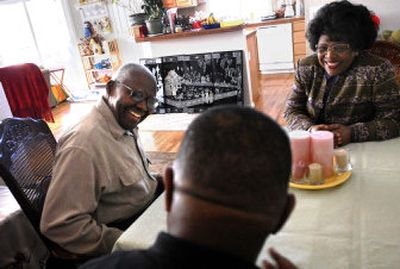The war for rights

At a time when the United States was engaged in an untenable occupation of a foreign country, America’s most prominent civil rights leader stepped forward to condemn a war that could not be won.
Local civil rights activists and clergy say the Rev. Martin Luther King Jr.’s denunciation of U.S. involvement in Vietnam 40 years ago resounds today as President Bush escalates the U.S. military presence in Iraq.
“That message should be proclaimed from all the pulpits of America because it is so relevant today,” said the Rev. Arthur Jarrett, of Spokane, minister at-large for the American Baptist Churches USA and a classmate of King’s at Morehouse College in Atlanta.
Then as now, the nation was divided, and many urged King not to stray from civil rights into politics and war. It was something King struggled with before addressing a meeting of Clergy and Laity Concerned at Riverside Church in New York on April 4, 1967, nearly nine months before the Tet Offensive.
“Their questions hit home,” King told the gathering, “and I knew that I could never again raise my voice against the violence of the oppressed in the ghettos without having first spoken clearly to the greatest purveyor of violence in the world today – my own government.”
It was a difficult time for the civil rights leader, according to Gonzaga University political scientist Blaine Garvin. Though King had won great victories in the South, he was meeting stiff resistance in his struggle to end segregation in northern cities. His anti-war stance cost him support.
“But it was consistent with his principles,” Garvin said, “and he wasn’t going to shy away from controversies.”
Jarrett, who with his wife, the Rev. Leotta Jarrett, participated in the civil rights movement in the 1960s, said King could not accept the fact that his country was squandering its wealth on “an unjust war” when so much help was needed at home.
In his speech, King told the nation that war was the enemy of the poor.
“I knew America would never invest the necessary funds or energies in rehabilitation of its poor so long as adventures like Vietnam continued to draw men and skills and money like some demonic, destructive suction tube,” he said.
“A nation that continues year after year to spend more money on military defense than on programs of social uplift is approaching spiritual death,” King said.
Jarrett and others who oppose the war in Iraq say King’s position then could not be more relevant to 21st century America.
Jarrett said, “If only a portion of the money spent in this war could be used to restore programs cut back because of lack of funds – after-school programs in inner cities, for example – this country would be far better improved.”
King also saw the war as “a cruel manipulation” of the poor and minorities, who were being sent to Vietnam in disproportionate numbers.
“We were taking the black young men who had been crippled by our society and sending them 8,000 miles away to guarantee liberties in Southeast Asia which they had not found in southwest Georgia and East Harlem,” King said.
Perhaps the most controversial aspect of King’s speech came when he questioned the intentions of his nation in first supporting French attempts to recolonize Vietnam after World War II and later backing the despot Ngo Dinh Diem. King asked America to consider the war from the perspective of a people who had spent generations in violent struggle for liberation.
“They question our political goals and they deny the reality of a peace settlement from which they will be excluded,” King said. “Their questions are frighteningly relevant. Is our nation planning to build on political myth again, and then shore it up upon the power of new violence?”
After all this time, said V. Anne Smith, president of the Spokane chapter of the NAACP, it would sadden King to see that we have not learned from our mistakes.
“Here we are in another war based on a lie,” Smith said. “And here we are talking about sending 20,000 more men.”
Now, as then, she said, “We are finding it difficult for those in high places to understand” King’s message.
Jarrett remembers that critics attempted to silence King’s voice by labeling him a Communist because he spoke out against the war, and called on young men of draft age to consider the alternative of conscientious objection.
“But somehow the voice of truth was not silenced and should not be silenced now,” Jarrett said. “We should speak out as boldly and justly as we can.”
King said the Vietnam War was “a symptom of a far deeper malady within the American spirit.”
“If America’s soul becomes totally poisoned, part of the autopsy must read: Vietnam. It can never be saved so long as it destroys the deepest hopes of men the world over,” King said.
“If we do not act,” King told the nation four decades ago, “we shall surely be dragged down the long, dark and shameful corridors of time reserved for those who possess power without compassion, might without morality, and strength without sight.”